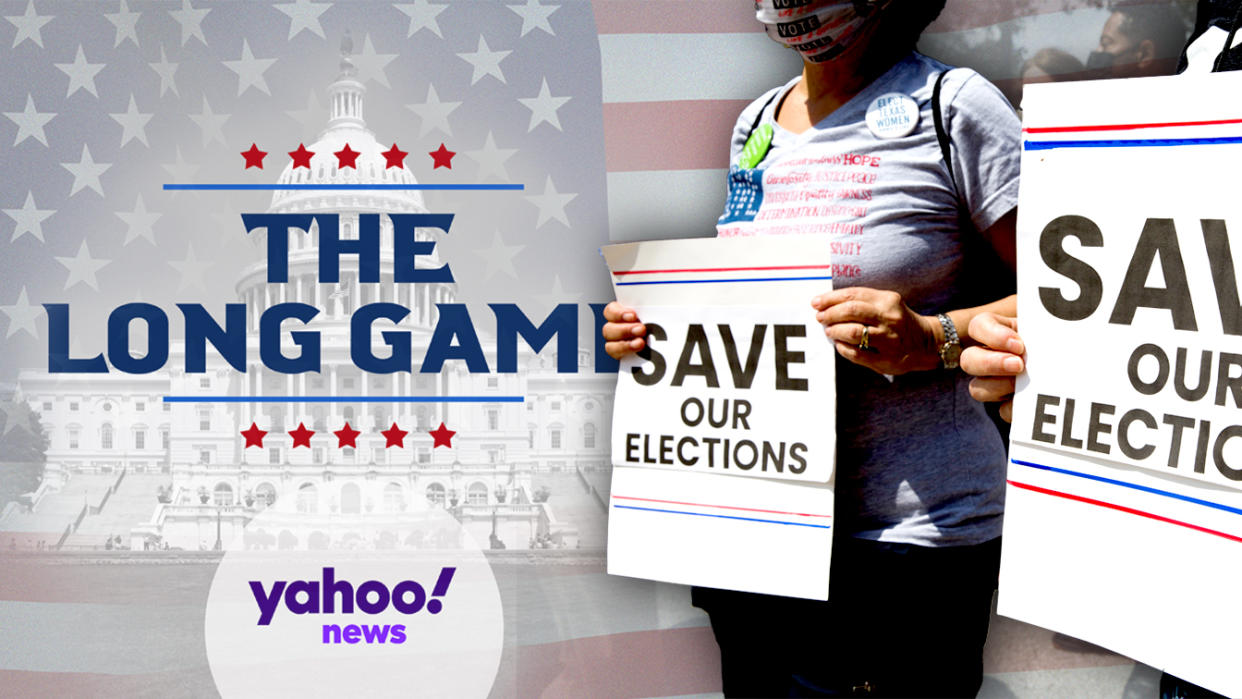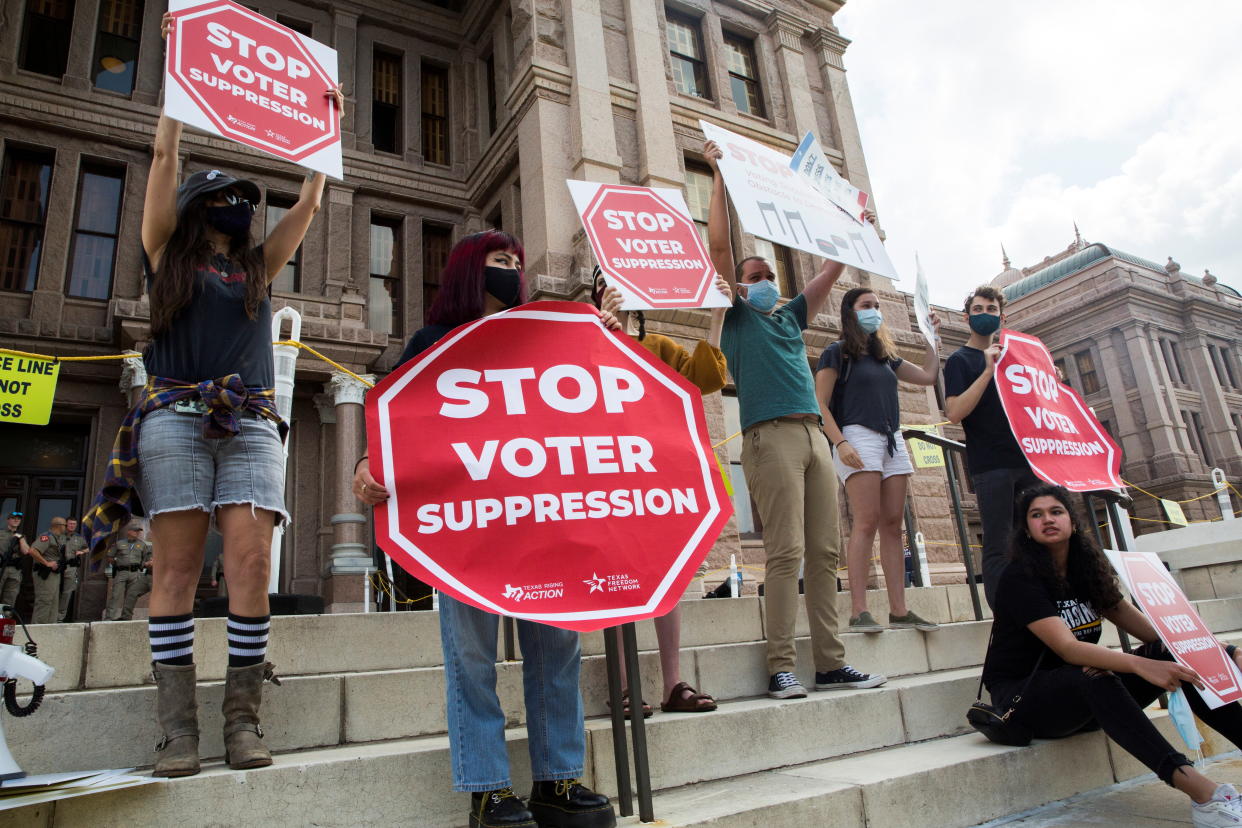Voting rights fight has distracted Congress from a more pressing threat to democracy, activists say
Congressional Democrats are pushing a bill that would expand voting rights, but they’ve done nothing to deal with the rising threat of state legislatures making it easier to change election results after voters have cast their ballots.
A new report released on Thursday offered the latest warning about a serious threat to election integrity and democracy itself, activists argue — one that has gone largely overlooked as Democrats have focused their attention on making it easier to vote.
“These are the ingredients for a democracy crisis,” said the report from Protect Democracy, a left-leaning legal advocacy group. It said that “the commitment of many state legislatures to attacking the foundations of our democracy appears to have deepened” just over the past two months.

The report — an update of one the group published in late April — found that 21 measures have been passed into law this year that give state lawmakers greater control over elections and the ability to punish election officials, and that there are 216 provisions in 41 states that have been proposed and are under consideration.
Many of these provisions are being pushed by Republican lawmakers who claim to believe former President Donald Trump’s baseless claims about the 2020 election being stolen.
The template is clear, according to Protect Democracy. In 2020, Trump tried to overturn the results of a fair election by making claims that had no supporting evidence. But despite the lack of proof, he and his supporters flooded the information space with bogus allegations and lawsuits that were largely frivolous.
Now, the group warns, Republicans in state legislatures are passing and proposing laws that would make it easier for them to throw out election results in the future.
Most concerning, Protect Democracy said, are new laws already passed in Georgia and Arkansas that would allow the respective state legislatures to throw out an election. Four other states — Arizona, Texas, Nevada and Missouri — are considering bills that would do the same. With the exception of Nevada, all these states have legislatures controlled by Republicans.
The Georgia legislation ignited a firestorm of criticism, but most of that was focused on provisions related to voting. What got less attention was the part of the law that hands more control over election administration to the Legislature and away from the governor and secretary of state.

“The law replaces the directly elected secretary of state as chair of the State Election Board with a 'chairperson elected by the General Assembly,'” and it also “empowers the State Election Board — now chaired by a legislative appointee — to investigate and replace local election officials whose competence has been 'call[ed] into question,’” Protect Democracy reported.
The group argued that these new provisions are a direct response to what happened in the 2020 election, when Gov. Brian Kemp and Secretary of State Brad Raffensperger rejected calls from Trump and his allies to throw out the results of the election in Georgia. The new law, the report said, “is a clear effort by legislators to wrest control of the state’s elections into their own hands.”
“In an extreme case, the legislature — acting through the Board — might be able to abuse this power in order to overturn the results of the election, for example, by replacing a superintendent to prevent the certification of election results,” the report continued.
Protect Democracy noted that “the potential for this crisis scenario is mitigated (although not entirely eliminated) by certain procedural safeguards” such as the fact that “a superintendent cannot be replaced without a hearing, which must take place at least 30 days after the initiation of proceedings against the superintendent.”
Since April, “the center of gravity of state legislative efforts to interfere with elections has shifted westward to Texas and Arizona,” the report said.
In Arizona, the group has identified 18 separate proposed bills that would “allow state legislatures to politicize, criminalize, or interfere with elections.”

“There is a bill that would bring a legislature into special session after every election. ... That’s clearly a response to what happened in 2020,” Jess Marsden, counsel for Protect Democracy, said in an interview on “The Long Game,” a Yahoo News podcast.
“Last year, there were legislators in Arizona who were clamoring for Gov. Doug Ducey to bring them back into session so that they could replace the slate of electors that voters chose with a slate that would ... cast their Electoral College votes for President Trump.
“So they’re taking the governor out of the narrative and essentially bringing themselves back into session after every election to create the opportunity that they didn’t have last year,” Marsden said.
Republicans in the Arizona state Senate are also in the midst of a shambolic attempt to find voter fraud despite the fact that the election results there have been reexamined and verified several times already. Republicans in other states are pursuing similar efforts.
Another major trend is the passage and proposal of laws that make it easier to sue election officials or to allow partisan politicians to launch criminal investigations into their conduct.
“It takes hundreds of thousands of people, many of them volunteers, and what these bills do is put a sword over their head, so as they’re making day-to-day decisions about, how do you run an election in uncertain circumstances, in a pandemic, in a natural disaster, what are the changes that they’re allowed to make? What can they do to make sure that the election runs smoothly?” Marsden said.
“It raises the specter of much more post-election litigation, much more chaos, and in a chaotic post-election period it creates many more opportunities for state legislatures to unlawfully step in and try to change the results, like we saw some legislators clamoring to do last year.”

This aspect of the push in state legislatures has provoked a response from two veteran election lawyers. Ben Ginsberg, a Republican, and Bob Bauer, a Democrat, are two of the top attorneys in election law and have represented their respective parties for decades in campaign disputes and legal advisory roles. They announced last week that they are “recruiting lawyers around the country, Democrats and Republicans, to establish a network that would provide free legal support to election officials who face threats, fines or suspensions for doing their jobs.”
“This national network will monitor new threats as they develop and publicly report on what it learns,” the two attorneys wrote.
They pointed to one case in particular: “Iowa state election officials are now subject to fines of $10,000 and suspension for any actions that ‘hinder or disregard the object of the law.’ They are also subject to criminal penalties when seeking to address disruptive conduct by partisan poll watchers,” they wrote.
“These state laws, and the blind rage against our election officials that they encourage or reinforce, will corrode our electoral systems and democracy,” Ginsberg and Bauer wrote. “They will add to the recent lamentable trend of experienced officials’ retiring from their active and vitally needed service — clearing the way for others less qualified and more easily managed by partisans.”
Laws like these have been proposed in the past, but this year represents a sharp acceleration in the number of such bills. Many if not most of the 216 provisions identified by Protect Democracy won’t become law. But some have, and others almost certainly will. Most concerning, the overall drift of these laws is an ominous one for democratic freedoms and the rule of law.

The burst of laws and proposals are “direct attempts to rig the game so that, should Democrats win another election that Republicans consider contested, the outcome can be manipulated,” Sheri Berman, a Barnard College political science professor, told the New York Times. “There is simply no way democracy can function if those designated to oversee its most basic institution are motivated by partisan rather than legal and constitutional concerns.”
And there is currently no legislation proposed in Congress to help push back against this antidemocratic wave of legislation, which poses a far more explicit threat to the constitutional system than the issues addressed in the voting rights laws currently being debated in Congress.
“Not only is there no legislation, there's not even a white paper, a journal article, a think tank policy brief, or anything else,” the New York Times’ Nate Cohn tweeted recently. And the voting rights legislation that Democrats are pushing for, known as the For the People Act, is stuck in Congress and unlikely to pass.
Election analysts are beginning to discuss what might be done in Congress.
“It wouldn’t take much to combat election subversion. Just some directives or minimum standards for ballot tabulation, election result certification, and bipartisan/nonpartisan administration,” Harvard Law professor Nick Stephanopoulos wrote on Twitter.
Richard Hasen, author of “Election Meltdown,” told Bill Scher of the Washington Monthly that Congress could require “nonpartisan election administration, either on the federal level or on the congressional level.”

And Hasen wrote in late April that “every jurisdiction in the United States should be voting with systems that produce a paper ballot that can be recounted in the event of a disputed election. Having physical, tangible evidence of voters’ choices, rather than just records on electronic voting machines, is essential to both guard against actual manipulation and protect voter confidence in a fair vote count.”
Marsden said she hoped congressional Republicans would support measures like these, as well as reforming the Electoral Count Act of 1887. Ginsberg wrote an op-ed last December outlining why and how the act could be updated. That law, which is derided by some scholars as muddled and unclear, stipulates how Congress should litigate a contested election. It has never been invoked.
“I think all the Republicans in the Senate today lived through Jan. 6. And I think, although they may not want to look back at it through a commission … they should still care very much about preventing it from happening again,” Marsden said.
“And so reforms to the Electoral Count Act, which is at this point more than a century old and really just needs to be updated for the modern era — those are the kinds of reforms that we think would alleviate some of these concerns and could also get support from Republicans who don’t want to live through a day like Jan. 6 again.”
Correction: An earlier version of this story misattributed a quote from Protect Democracy counsel Jess Marsden to Protect Democracy co-founder Ian Bassin.
____
Read more from Yahoo News:






